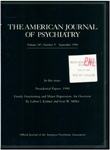Mood disorders in the psychoneurologic borderland: three cases of responsiveness to carbamazepine
Abstract
Three patients with affective disorders with psychotic features were refractory to various combinations of psychotropic agents (antipsychotics, antidepressants, and lithium). Closer scrutiny revealed a seizure history in two patients and unusual neuropsychiatric features in the third patient. Subsequent substitution of carbamazepine for the antipsychotic resulted in control of the patients' psychoses. The authors describe clinical features that may identify the patient who may respond to carbamazepine. The mechanism of carbamazepine's psychotropic effects through its hypothesized ability to inhibit limbic system kindling is discussed. The case reports emphasize the need for careful neuropsychiatric assessment of patients who are refractory to conventional treatments.
Access content
To read the fulltext, please use one of the options below to sign in or purchase access.- Personal login
- Institutional Login
- Sign in via OpenAthens
- Register for access
-
Please login/register if you wish to pair your device and check access availability.
Not a subscriber?
PsychiatryOnline subscription options offer access to the DSM-5 library, books, journals, CME, and patient resources. This all-in-one virtual library provides psychiatrists and mental health professionals with key resources for diagnosis, treatment, research, and professional development.
Need more help? PsychiatryOnline Customer Service may be reached by emailing [email protected] or by calling 800-368-5777 (in the U.S.) or 703-907-7322 (outside the U.S.).



